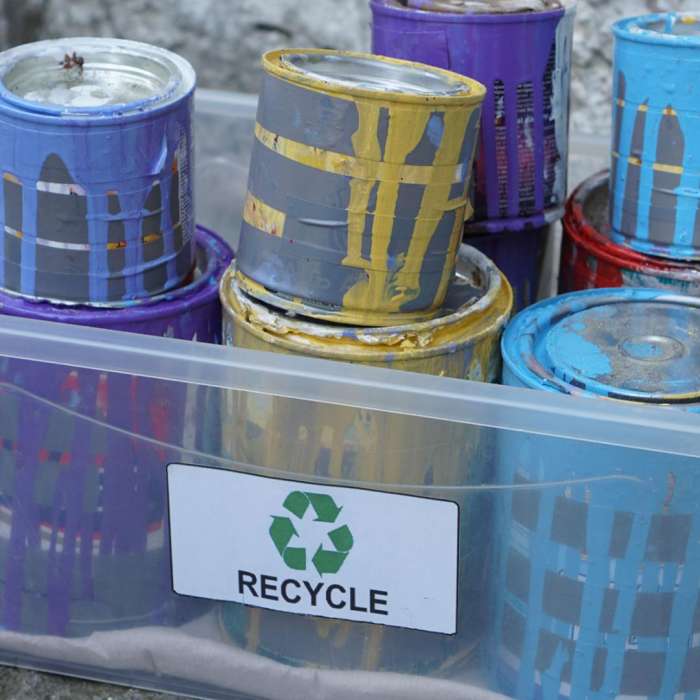Blog
4 Compelling Reasons to Recycle Household Hazardous Waste
August 2nd, 2022

Household Hazardous Waste (HHW) is any waste that can harm human health or the environment. Hazardous waste of any kind needs to be appropriately managed or safely recycled at a hazardous waste disposal facility. Some examples of HHW include batteries, paints, lacquers, household appliances, and other items that are not biodegradable.
At Hazman, we know recycling household hazardous waste items is necessary to conserve energy and resources and protect the environment.
We believe that companies and households should recycle hazardous waste for the following reasons.
1. Recycling Keeps Household Hazardous Waste Out of Landfills
Hazardous waste management facilities receive waste for treatment, storage, or disposal. Many items can be treated and recycled for reuse in manufacturing settings. Other items are safely processed or stored in containment units in ways that comply with the Resource Conservation and Recovery Act (RCRA) regulations.
Not every item is recyclable, which is why Hazman finds alternative solutions to landfills. Hazman works with local companies to ensure that non-recyclable items are safely processed and used to recover energy.
Waste to Energy is a sustainable option to minimize the amount of waste in landfills. Technologically advanced methods turn non-recyclable waste into heat, electricity, or fuel.
2. Recycling Protects Communities from Hazardous Waste Exposure
There is no shortage of research to show how recycling protects communities from the potential effects of discarded hazardous waste.
One of the ways recycling helps communities is by reducing soil pollution. Soil has a profound impact on the health of a community. According to researchers from the National Institute of Health, people in professions that work closely with soil, like farmers, are at a greater risk of health problems. Contaminated soil can also pass on harmful substances through food sources.
Recycling hazardous waste also prevents water from becoming contaminated. Hazman accepts and safely disposes of motor oil, auto fuel, paints, and lacquers. Even though these items are liquids, they should not go down drains.
Municipal water treatment plays a role in protecting drinking water from pollutants; however, chemical and biological contaminants remain a threat.
Sustainable recycling options make it easy for environmentally-conscious communities to keep toxins from soil and drinking water.
3. Recycling Household Hazardous Waste Slows Down Climate Change
Many people claim to care about the environment and the negative impact of hazardous waste pollution on the earth’s atmosphere. Over half of voters in the United States believe climate change is a critical issue. Climate change is at the forefront of political debate agendas and election campaign messages across America. Unfortunately, it seems the focus is primarily on the cause of climate change and not on viable solutions.
Recycling hazardous waste is one tangible solution to slow down climate change. It’s relatively simple. Recycling hazardous waste keeps toxic and dangerous items out of landfills, reducing the number of greenhouse gases emitted from them.
High levels of greenhouse gases (gases that trap heat in the atmosphere) contribute to rising sea levels, increased temperatures, melting glaciers, and declining ecosystems - landfills are primarily responsible for these catastrophic events.
In the United States, there are approximately 2,632 active landfills. Landfills are not inherently bad for the environment because they keep towns and cities clean(ish), but recycling is a much more sustainable solution to waste management.
The primary issue with landfills is the amount of methane and carbon dioxide released into the atmosphere. Methane is a harmful greenhouse gas that is a byproduct of decomposed organic matter.
Environmental Protection Agency (EPA) states that “methane is more than 25 times as potent as carbon dioxide at trapping heat in the atmosphere.” Methane concentrations in the atmosphere more than doubled in the last two centuries due to human activities. In one article, EPA claims that “achieving significant reductions would have a rapid and significant effect on atmospheric warming potential.”
Hazman offers real solutions to problems caused by greenhouse gases.
4. Recycling Creates Jobs
As the demand for recycling increases, so does the need for employment in the recycling industry. Recycling creates more jobs than landfills or incineration because it is more labor intensive. The skills required to work in this industry vary greatly depending on the options within the field.
National Institutes of Health reports that incinerating 10,000 tons of waste creates one job, and landfilling the same amount creates six jobs. Recycling the same 10,000 tons creates 36 jobs!
Household hazardous waste facilities like Hazman employ drivers, managers, engineers, mechanics, technicians, and other administrative personnel.
Hazman Makes Recycling Easy
Hazman makes it easy for communities to recycle household hazardous waste items.
We offer solutions to people who want to safely dispose of corrosive, ignitable, or toxic household waste. All HHW items are reused, recycled, or processed for renewable energy sources.
Hazman has a drop-off center conveniently located in Tonawanda, NY, or you can schedule a time for our team to pick up waste from your residence or place of business. We also offer customized HHW programs for government agencies and organizations.
Our facility can accommodate a wide range of household waste from homeowners and those who qualify as a Conditionally Exempt Small Quantity Generator(CESQG).
Some examples of HHW include:
*paints and solvents
*aerosols
*pesticides
*gasoline
*electronics (TVs, computers)
*air conditioners
*refrigerators
*propane tanks
*automobile batteries
*pool chemicals
Visit our website for a complete list of accepted items.
Together, we can protect human health and minimize the harm done to the environment.
